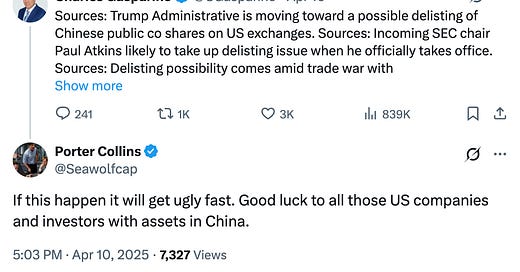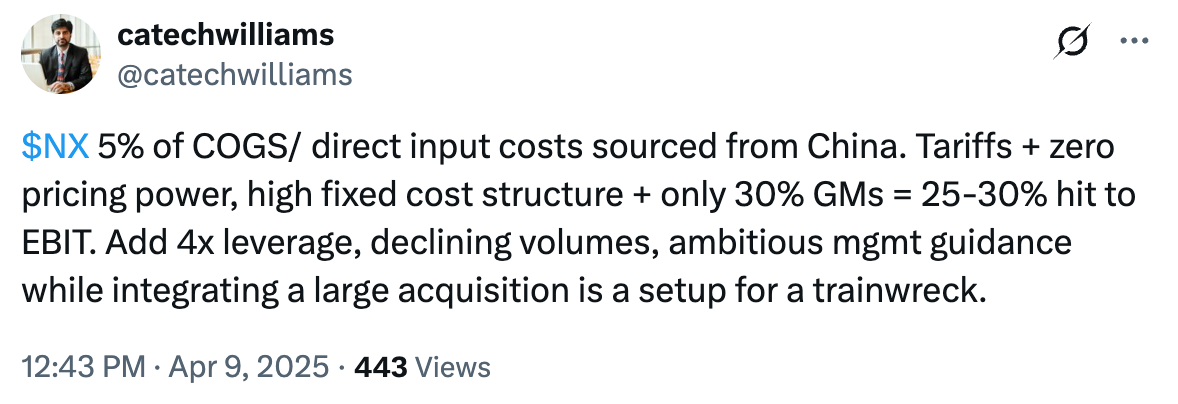The Bear Cave #269: China Edition
New Activist Report, Recent Resignations, and Tweets of the Week
Welcome to The Bear Cave! Our last premium articles were “Problems at Ibotta (IBTA)” and “Problems at KinderCare Learning Companies (KLC)” and our next special investigation comes out this Thursday, April 17.
New Activist Report
Spruce Point Capital published on Monster Beverage (NASDAQ: MNST — $56.6 billion), the energy drink company. Spruce Point said the company “faces pressures from increasing competition, changing regulatory environments, and unsustainable international growth” and claimed that the company’s “core energy brand is being challenged in a changing environment where social media celebrity endorsers and athletes can rapidly launch new products to their millions of followers.”
China’s Comment Letter Concerns
SEC comment letters are informal but revealing exchanges between the SEC and public companies and often serve as early warning signs of deeper problems. Amid growing speculation that the Trump Administration could move to delist Chinese stocks, The Bear Cave reviewed hundreds of SEC comment letters to uncover signs of rising tension. Below are some of the most notable.
PDD Holdings (NASDAQ: PDD — $126 billion), a Chinese online retailer that also owns Temu (an app for U.S. and European customers to buy discount goods from Chinese merchants), responded to two lengthy SEC comment letters in September 2024 and in January 2025 – both are excellent reads. Selected excerpts below:
SEC Comment (January 2025): “You list your headquarters as Dublin, Ireland, yet it appears all of your operations and customers are located in China. In addition, your Irish subsidiary appears to be a holding company in your Temu line of business. Please clarify.”
PDD response (January 2025): “The Company respectfully submits that the designation of its address at Dublin, Ireland as its principal executive offices in its 2023 Form 20-F was based on where the Company’s key decision-making activities took place… The Dublin Office is particularly well-suited for coordinating global operations due to its strategic time zone, which facilitates communication across Asia, Europe, and the Americas, as well as its English speaking environment…”
SEC comment (January 2025): “We note your revised disclosure in response to comment 9 and reissue our comment in part. Pages 9 and 43 still include references to ‘multiple jurisdictions’ with respect to disclosure that was previously focused on risks related to the PRC government. Remove the mitigating language and discuss plainly and directly the risks relating to doing business in China, separate from the risks you may face in other jurisdictions.” (Emphasis ours)
SEC comment (September 2024): “Describe the risk that the Chinese government may intervene or influence your operations at any time, which could result in a material change in your operations and/or the value of your securities. Also, given recent statements by the Chinese government indicating an intent to exert more oversight and control over offerings that are conducted overseas and/or foreign investment in China-based issuers, acknowledge the risk that any such action could significantly limit or completely hinder your ability to offer or continue to offer securities to investors and cause the value of such securities to significantly decline or be worthless.” (Emphasis ours)
PDD Holdings is the only public company with a market capitalization above $1 billion to receive that specific comment from the SEC in the last year, according to an SEC Full-Text Search.
JD.com (NASDAQ: JD — $58.7 billion), a large Chinese e-commerce company, also received a September 2024 comment letter where the SEC asked the company “to state more directly that, to the extent cash or assets in the business is in the PRC or Hong Kong, the funds or assets may not be available to fund operations or for other use outside of the PRC.” In a February 2025 follow-up letter, the company was also asked for more disclosure “relating to the risk that the PRC government may intervene in or influence your operations at any time.” Likewise, Trip.com (NASDAQ: TCOM — $39.8 billion), a Chinese online travel agency, was also asked in a January 2025 comment letter for more disclosure “relating to the risk that the PRC government may intervene in or influence your operations at any time.”
Kingsoft Cloud Holdings (NASDAQ: KC — $3.43 billion), a Chinese cloud service provider, received a December 2024 comment letter and a January 2025 follow-up letter largely around its VIE structure for foreign investors. The SEC’s December 2024 comment letter said, in part:
“We note your disclosure that all of your senior executive officers reside within China for a significant portion of time and most are PRC nationals… please include a separate ‘Enforceability’ section that addresses whether or not investors may bring actions under the civil liability provisions of the U.S. federal securities laws against you, your officers or directors who are residents of a foreign country, and whether investors may enforce these civil liability provisions when your assets, officers, and directors are located outside of the United States.”
Caveat emptor.
Recent Resignations
Notable executive departures disclosed in the past week include:
CEO of SmartRent (NYSE: SMRT — $145 million) departed after just forty-five days and also resigned from the board. The company has had four CEOs and three CFOs in the last three years and is down ~90% since its August 2021 SPAC merger. In September 2023, Bleecker Street Research raised safety concerns about the company’s digital locks and described the company as a “mess” with a “broken culture.”
CFO of Microvast Holdings (NASDAQ: MVST — $563 million) departed after just six months. In December 2024, the company’s Chief Accounting Officer also resigned “for personal reasons” after nearly six years. The battery technology company has had five CFOs in the last five years and is down ~80% since its July 2021 SPAC merger.
CFO of indie Semiconductor (NASDAQ: INDI — $434 million) resigned after six months and “is expected to remain with the company until the company files its next Quarterly Report on Form 10-Q, on or about May 13, 2025.” The company is down ~80% since its June 2021 SPAC merger.
CFO of Arcutis Biotherapeutics (NASDAQ: ARQT — $1.49 billion) departed after a little over one year.
CEO of Harley-Davidson (NYSE: HOG — $2.79 billion) announced plans to retire after nearly five years and the company “is engaged in an on-going CEO search process.” The transition announcement was preceded by a scorching resignation letter from board member Jared D. Dourdeville who called for the immediate resignation of the company’s CEO and resignations of two other board members.
Mr. Dourdeville works for H Partners, which owns ~9% of Harley-Davidson, and raised concerns about “the cultural depletion of Harley-Davidson,” “revolving door of senior leadership,” “a void at the entry level of [the company’s] product lineup,” and said “Harley-Davidson lacks a winning culture” and alleged that “most white-collar Harley-Davidson employees were working remotely.”
CFO of Lotus Technology (NASDAQ: LOT — $800 million) resigned “for personal reasons” after 26 years and will remain on the company’s board. In December 2024, a board member resigned “effectively immediately” for personal reasons after two years. The Chinese luxury electric vehicle company is down ~90% since its February 2024 SPAC merger. The company received several pointed comment letters from the SEC including an October 2023 comment letter concerning “specific disclosures relating to [how] rules and regulations in China can change quickly with little advance notice,” a December 2023 comment letter to “remove any implication that investors should not rely on the information presented,” and a May 2024 comment letter to “address areas that appear to need updating or that present inconsistencies.”
Board member of EverCommerce (NASDAQ: EVCM — $1.85 billion), Ms. Alexi Wellman, resigned “for personal reasons” after just six months. Ms. Wellman continues to serve on the boards of two other public companies. Since January 2024, three other board members, the company’s CFO, and the company’s Chief Human Resources Officer have all departed.
Chairman of Ammo Inc (NASDAQ: POWW — $158 million) resigned effective immediately after eight years and “entered into an Executive Separation Agreement” that includes “a cash separation payment equal to $700,000.” In September 2022, The Bear Cave published on Ammo Inc and wrote,
“Among the company’s many quirks: a former NASCAR star and NRA executive currently sit on the board, an alleged pump-and-dump artist is listed as a key employee, a former board member raised concerns about whistleblower retaliation, and a current board member is running a proxy fight against his fellow board members. Let’s dig in.”
The company has since fallen ~65%.
Data for this section is provided by VerityData from VerityPlatform.com
What to Read
“The heat is on for newly confirmed SEC chairman Paul Atkins to crack down on Chinese companies” (Charles Gasparino)
“Scott said his confirmation vote was contingent on Atkins ramping up scrutiny on Chinese companies — ‘delisting’ and removing those suspected of violating US laws from US exchanges — as soon as he got into office.
The crackdown would be significant, probably one of the biggest the SEC has undertaken in its history. Nearly 300 Chinese companies, representing more than $1 trillion in market value, trade on US markets, namely the New York Stock Exchange and the Nasdaq Composite.”
“Jim Chanos on Who's Getting Caught Swimming Naked” (Bloomberg podcast)
“On this episode, we speak with legendary short-seller Jim Chanos, now the founder of Chanos & Co…”
“Quick Head’s Up – One Company I’m Watching” (Herb Greenberg)
“Karman Holdings (NYSE: KRMN — $4.10 billion): This aerospace and defense rollup went public February 12 at $19, and swiftly rocketed up to $37, before gravity took over. As I write this it’s around $28. The red flags are many, including...
This is a less than five-year-old PE-backed company whose IPO appears to be an opportunistic attempt to cash in on the race-for-space economy, with drones as a bonus, while the window remains or remained open.
In this case, like most IPOs, Karman offers up a long list of risks, including the impact of tariffs and the reality that three customers generated 47.2% of revenue as of the end of 2023.
What about 2024? Well, Karman delayed its first 10-K as a public company. The reason: ‘To ensure sufficient time to complete remaining administrative audit tasks, as a result of the significant audit activity associated with its February IPO that delayed the start of the fiscal year 2024 audit.’”
Tweets of the Week
Until Thursday,
The Bear Cave










